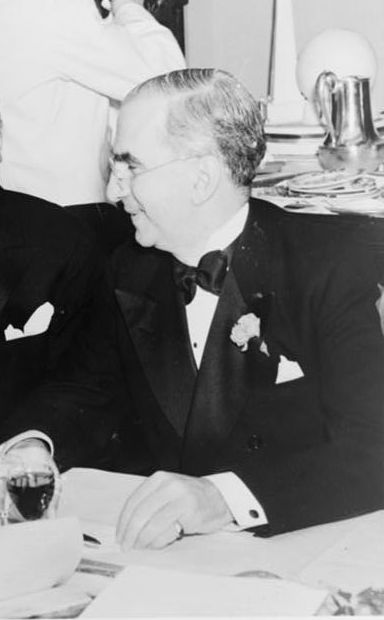AFFIDAVIT OF GEORGE S. MESSERSMITH.
George S. Messersmith, being first duly sworn, deposes and says:
During the years 1930 to 1934, when I was American Consul General in Berlin, I knew Dr. Hjalmar Schacht very well. I had frequent contact with him. My official duties brought me into frequent contact with him as head of the Deutsche Reichsbank and as Minister of Commerce, and on such occasions and in numerous private conversations he discussed with me the aims and activities of the Hitler regime.
It must be stated in this connection that Dr. Schacht was a man of extraordinary capacities in the financial field and of extraordinary resourcefulness. He was, however, at the same time an extraordinarily egotistic and vain man. There is no doubt that he nourished the ambition of becoming president of Germany, and it was his hope in aiding the industrialists and financiers in Germany in bringing the Nazi Party into power that these elements, instead of the Nazis, would control in fact, and that he would be the President of Germany.
Dr. Schacht always attempted to play both sides of the fence. He told me, and I know he told both other American representatives in Berlin and various British representatives, that he disapproved of practically everything that the Nazis were doing. I recall on several occasions his saying, after the Nazi party came into power, that if the Nazis were not stopped', they were going to ruin Germany and the rest of the world with it. I recall distinctly that he emphasized to me that the Nazis were inevitably going to plunge Europe into war.
693260—46—33
District of Columbia United States of America
ss
509
EC-451
While making these protestations, he nevertheless showed by his acts that he was thoroughly an instrument of the whole Nazi program and ambitions and that he was lending all his extraordinary knowledge and resourcefulness towards the accomplishment of that program. It was his financial ability that enabled the Nazi regime in the early days to find the financial basis for the tremendous armament program and which made it possible to carry it through. If it had not been for his efforts, and this is not a personal observation of mine only but I believe was shared and is shared by every observer at the time, the Nazi regime would have been unable to maintain itself in power and to establish its control over Germany, much less to create the enormous war machine which was necessary for its objectives in Europe and later throughout the world.
The increased industrial activity in Germany incident to rearmament made great imports of raw materials necessary while at the same time exports were decreasing. Yet by Schacht's re. sourcefulness, his complete financial ruthlessness, and his absolute cynicism, Schacht was able to maintain and to establish the situation for the Nazis. Unquestionably without this complete lending of his capacities to the Nazi Government and all of its ambitions, it would have been impossible for Hitler and the Nazis to develop an armed force sufficient to permit Germany to launch an aggressive war.
In my opinion Schacht was in no sense a captive of the Nazis. He was not compelled to devote his time and his capacities to their interest. His situation was such that he would most likely have been able either to work on a much less restrained scale or to abstain from activity entirely. He continued to lend his services to the Nazi government out of opportunism.
/s/ G.S. Messersmith
Subscribed and sworn to before me, A Notary Public, James S. Regan, in Washington, D. C., this 15th day of November, 1945.
Search the archive
Affidavit concerning Schacht's equivocal and opportunistic political views and his role in financing the Nazi regime and rearmament
Authors
George S. Messersmith (U.S. consul general in Germany & Austria)
George S. Messersmith
American diplomat (1883-1960)

- Born: 1883-10-03 (Fleetwood)
- Died: 1960-01-29 (Dallas)
- Country of citizenship: United States of America
- Occupation: diplomat
- Position held: United States Assistant Secretary of State; ambassador
- Educated at: Kutztown University of Pennsylvania
- VIAF ID: https://viaf.org/viaf/10609479
- ISNI: https://isni.org/isni/0000000028126714
Date: 15 November 1945
Literal Title: Affidavit of George S. Messersmith.
Defendant: Hjalmar Schacht
Total Pages: 2
Language of Text: English
Source of Text: Nazi conspiracy and aggression (Office of United States Chief of Counsel for Prosecution of Axis Criminality. Washington, D.C. : U.S. Government Printing Office, 1946.)
Evidence Code: EC-451
Citations: IMT (page 2544), IMT (page 2554)
HLSL Item No.: 452754